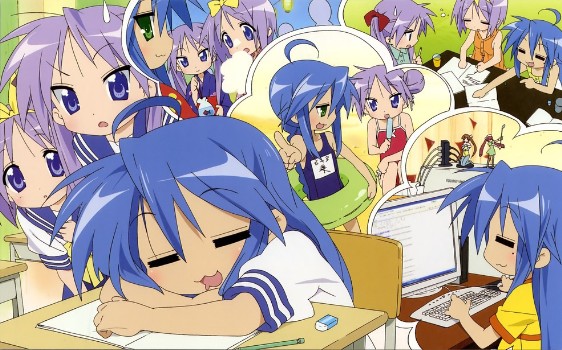
Honorifics are a fun part of the Japanese language, especially in the way they spice up the uniqueness of anime for English speaking fans. As most of us will agree, there are tons of anime with fantastic character relationship development and depictions of character interactions. It’s also equally amazing what a major yet subtle role honorifics play in this and how they can offer various interpretations of the characters…
One of the first notable things about honorifics in anime is that they give us clues about the characters’ relationships right away, even before we get to know them.

In the first episode or two of Lucky Star, before the four main girls have a chance to get fleshed out, the honorifics alone tell us a lot about how they relate to each other, i.e., they’re obviously friends since they’re all on a first name basis, Konata and Kagami are friends yet not quite in the affectionate manner of adding “-chan” to each other’s names, the girls must look up to Miyuki since they add “-san” to her name even though they’re peers, etc,. Before you even get to know the characters, you can tell a lot about their personality and how they relate to each other just by a few honorifics.
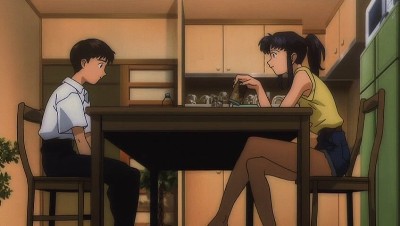
Right away in the first episode of Evangelion, Misato opts to call Shinji “Shinji-kun” rather than the more formal “Ikari-kun.” Right off the bat, the sisterly part of her personality is shown. However, she doesn’t use the equal female honorific “-chan” for Asuka and Rei, even though they’re in the same peer group as Shinji. This alone reveals several things – perhaps Asuka’s overly independent personality and Rei’s stoic, distant personality make Misato less obliged to add this term of affection. Or perhaps she just has a special affection for Shinji and his more vulnerable personality.
Once you do get to know the characters of course, honorifics not only reinforce relationships, but offer other subtleties about the characters that may not be known otherwise.
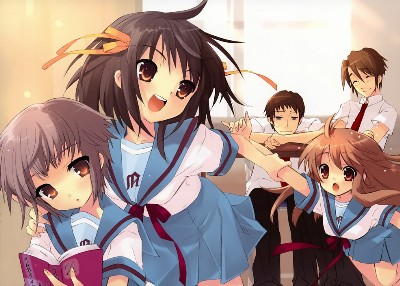
The honorifics within the SOS Brigade imply a lot of things. Despite the fact that Mikuru is an upperclassman, Haruhi calls her “Mikuru-chan,” obviously because she considers her a cute, moe mascot character. She has enough affection for Yuki to call her by first name, but without the cuteness factor of adding “-chan,” probably because of Yuki’s emotionless demeanor. Mikuru and Itsuki call the other Brigade members by last name+san, showing their politeness. However for Kyon, Mikuru calls him “Kyon-kun,” implying that she feels more comfortable with him than she does with the others. Kyon calls Itsuki and Yuki by last name without honorifics, whereas he calls Mikuru “Asahina-san.” This shows that perhaps he has a certain gentlemanly respect for her not just as an upperclassman (as opposed to using “Asahina-sempai,” which would greatly emphasize this). His ambivalent relationship with Haruhi is made apparent by calling her by first name, honorific-free – if he really does have respect and affection for her, he doesn’t want to show it =P And characters who use full names to refer to people, as Yuki does with everyone, are usually very distant and insensitive, or at least they want to appear that way.
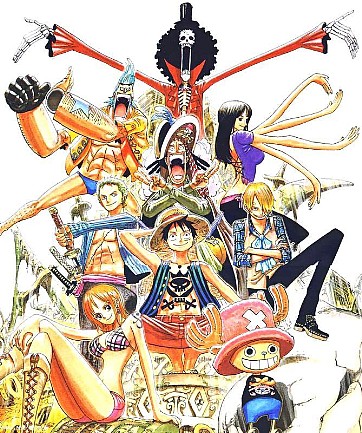
Lack of honorifics can reveal almost as much. The majority of the Straw Hats refer to each other by first name (or a nickname) without honorifics. My interpretation of this is simply an implication of their “nakama-hood.” As their memorable little song implies, they’re not friends necessarily, but rather, comrades or allies – “nakama.” This means that they may not even like each other much (Zoro and Sanji for example) but they have an innate loyalty to and bond with each other without necessitating terms of affection or respect. Sanji’s use of humorous honorifics for Nami and Robin simply show his individual feelings towards the opposite sex. I’ve noticed lack of honorifics for other groups of characters, such as the Cowboy Bebop members and the wolves in Wolf’s Rain – they too have that implied “nakama-hood” which means they’re like a makeshift family without always having to display their love and respect for each other.
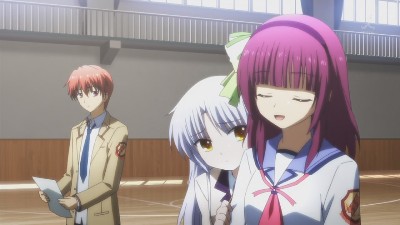
As I’ve shown with the above examples, honorifics, or lack of, open up all kinds of ways for fans to interpret the relationships of characters. Even a seemingly minor thing like Yuri calling Kanade “Kanade-chan” towards the end of Angel Beats! as opposed to “Tachibana-san” or just “Kanade.” Is she projecting that big sister side of her personality? Does she now have a special affection for Kanade because she feels guilty about how she treated her when they were enemies? It’s amazing how much interpretation even just one honorific can bring up.
Unfortunately honorifics don’t translate well in English dubbed anime. Translating “-san” as “Mr.” or “Miss” usually sounds unnatural, especially when used among characters in the same peer group (Kyon calling Mikuru “Miss Asahina” sounds a little awkward – but I’m glad nobody calls Kyon or Itsuki “Mr.” ’cause that would just sound weird). Some dubs include the honorifics in their scripts while others drop them without even translating them. I don’t know what the best method should be for dubbing honorifics – maybe just translate them when you can and drop them or replace them with an English equivalent if they sound too strange. As for honorifics in subtitles, I don’t really care if they’re there or not since you can hear them either way.
I could probably write a paragraph or two about honorifics in every anime I’ve seen, but I’ll stop here. That just goes to show what an indispensable part of anime they are, especially for us English speaking fans, yet most of us probably don’t give them enough thought ;)
I didn’t notice the one about Eva :o
Good to know.
Yeah, there’s so much going on in Eva, the honorifics aren’t something we usually notice XD
Anymore? besides these?
Hey!!! my name is Eva too!
While they don’t translate to English very well, honorifics do give a great immediate example of the relationship between two characters. Of all the shows I’ve seen, only Saki would deviate from that strategy with the main characters always referring to each other by their last name and adding -san when their friendship deepens throughout the season.
On Haruhi, there’s a wonderful chart at B-T that displays the use of names for each of the main characters. There’s one thing that I never realized until it was pointed to me but Kyon changes how he calls Haruhi in the first novel. All throughout the novel he calls her “Suzumiya” without any suffix until the morning after the dream when he calls her “Haruhi” from then on. He may mention her given name, but all of that is in his monologue for that novel. It’s a wonderful example of two characters getting closer that doesn’t translate to English very well.
I noticed that very same thing and I thought it was very wonderfully done! Especially since, Kyon being Kyon, it’s never addressed or anything.
I remember looking at that chart. I also remember that Kyon called Haruhi “Suzumiya” just once or twice early on before switching to “Haruhi.” What’s also kinda funny is that Mikuru asked him to call her by her first name when they met but he continues to use “Asahina-san.”
“This means that they may not even like each other much (Zoro and Sanji for example)…”
Gee, I’ve seen some fan art where Zoro and Sanji seem to “like” each other QUITE A BIT. ;) ;) ;)
LOL, I don’t doubt it. Their relationship has similarities to Naruto and Sasuke – they’re rivals who never miss an opportunity to argue with each other, but deep down they’re “nakama.” So naturally they’d attract a lot of yaoi fan works XD
In general, I really like how honorifics can give you so much insight into character relationships. My favorite dubs are the ones where they add the honorifics in, instead of putting “Miss” and such.
As someone who, IRL, almost never refers to anybody by any name anyway, I find hearing dubs where they try to translate honorifics quite jarring. I’d never CONSIDER calling a friend Miss or Mr. anything.
I dunno, hearing “-chan” and “-san” used in an English dub sounds out of place to me. Maybe it’s ’cause it makes me think of weaboos in real life who use random Japanese whenever they can but otherwise speak English =P
Yeah, in Japanese it’s natural to call everyone except close friends by last name plus an honorific, especially in a school setting. Contrastingly, teachers and students usually use first names when talking to each other here in America, so hearing a dub where everyone uses last names sounds kinda weird. Some dubs change the last names to first names to make it sound less awkward.
This is one of those things that you simply have to learn to understand in order to appreciate properly. There really is no way to translate them properly into English (or Spanish, or Portuguese even). Just as the previous poster said, I do find it a bit jarring when it’s used in subs, or dubs. It simply does not fit in English, and it is perfectly normal not to use them when talking in English.
I remember watching a fansub episode a long time ago, where the translators simply added a note at the end with the meaning of each honorific. That actually got me more interested and I went to research what each honorific meant. And just like you said, it really does add a whole different dimension to the relationship between characters.
Honorifics are probably one of the first things new anime fans notice. They’re fun not only because they’re easy to learn and understand (even if you can’t understand the rest of the dialogue), but like you said, they add more insight to the character relationships that we don’t get in English.
I love paying attention to honorifics. The things you can tell from them are really the only reason I didn’t complain about their use in Kuroshitsuji. I would have, otherwise, considering Kuro takes place in England and logic dictates that honorifics (Japanese ones!) are not used in England, haha. But I liked them being there all the same.
Yeah, hearing honorifics, or even Japanese for that matter, in a setting that should definitely be English-speaking, is a little awkward. But hey, it’s anime, so it’s never too hard to suspend your belief =)
Hey! You’re right now that i think about it. Well… thanks.
bye.
–End–
Thanks for reading~
I like hearing honorifics in anime but I agree that hearing them in English would be odd. One of my main reasons I don’t listen to dubs. Also, about how honorifics are fun, they’re fun until you get to the honorific verbs! >_<
Oh yes, the honorific verbs can be a nightmare. I had trouble with those in my Japanese classes. Since you don’t hear or use them very often, especially in anime, they don’t stick in my head very well.
I am quite new of an anime fan but i dont care old fan or new anime is the best every way. but at school i have loads of friends but every time i bring up anime they say whats anime and somtimes it makes me feel like i am the only one my age which is 11 by the way who actually likes anime well i have my best friend jazmine and she loves anime to but we dont go to the same school but she is the same age as me. when i asked her if any of her mates liked anime she said that no one at her school knows what it is. so what we are doing is finding out about some more animes and tying to get everyone into anime again in egland !!!
Re: using honorifics in English, while I don’t really mind honorifics too much, I don’t think I’d ever use them when translating something. A good translator ought to be able to convey these relationships without the use of honorifics. I’m sure there are times when they convey subtleties not present in English, but that’s going to be true of many words and their connotations. Using them is transliteration rather than translation, renders the English awkward since no English-speaker uses them (especially in a dub!), and makes the work in question seem unnecessarily foreign, like an intellectual exercise instead of a work of entertainment or art.
‘Azumanga Daioh’ has a good example. There’s a scene where Kaori asks Mr. Kimura not to call her by her nickname, ‘Kaorin’. He responds that she can call him ‘Kimurin’ if she likes, and Yen Press transliterated it in their version. I get the joke, but it completely lacks punch in English. ADV, for all its faults, did much better in their version by replacing ‘Kimurin’ with ‘Mr. Kim-Kims’. Less literal, but much funnier in English.
The issue of translating things such as this is definitely at the very heart of one of many major issues one must tackle to translate.
In these cases, the lines really can’t be translated in isolation, but as a set. Whereas Japanese has a built in set of tools (as much of the East Asian Sphere does, thanks to heavy Confucian influences) for quick notation of perceived relationship and intimacy (or more importantly, relative social status), English (for example) lacks these things.
What you must do instead, then, is to attempt to infuse that character’s lines towards this character, or that character, with the vocabulary, rhythm, grammar, etc. suited for the understood relationship dynamic.
This is at the heart of why machine translation is so faulty, in many cases. It can certainly “translate” meaning–to look through a dictionary and come to what the closest comparable word is in another language, or even navigate the grammar properly–but the integral part that a translator gives to a translation is the interpretation. In a way, the translation is inevitably colored by the translator, since it’s the translator who does the grunt work of interpretation, and formulating an equivalent of the “true meaning” of the source sentence.
Obviously, dialogue is not quite so harsh. The true difficulties start when you start thinking about how to translate the mood, atmosphere, and pacing of say, a person’s writing style, for prose or even worse, poetry.
As for the inclusion of untranslated honoriffics in translations, they’re sort of gimmicky, but I don’t really feel so strongly about it so it does not really bother me. With print, I suppose I’d prefer to not see it, if the work has a setting that is not Japan. But really, for works that take place in Japan, even though I’m reading English, the inclusion of untranslated honoriffics aren’t really that distracting.
Probably what bothers me most though, is when in anime, names are “translated” by being put into English name order. I understand why, to facilitate understanding by using the format most familiar to the West.
But on the other hand, if they are subtitles, there’s a great disconnect in my mind when my eyes parse say, “Ayumu Aikawa” while my ears hear “Aikawa Ayumu”. Though, fair enough, I’m scratching the surface to being able to understand most dialogue unaided, so that might be the source of my discontent.